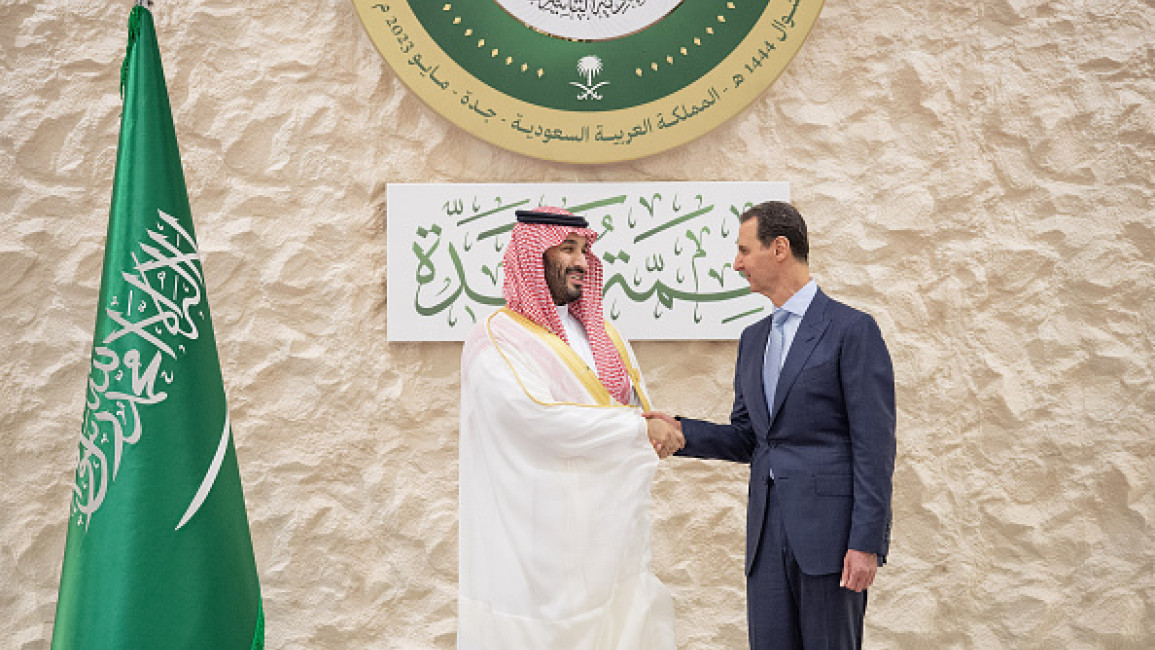Saudis, UAE lobby Europe to restore ties with Assad regime
Saudi Arabia and the UAE are lobbying several of their European allies to restore diplomatic relations with Bashar al-Assad and ease economic sanctions on the Syrian regime, according to Bloomberg.
The efforts by the Gulf states have been going on at various levels over the course of months, with a particular focus on trying to win European support for lifting sanctions on key regime figures.
They argue that diplomatic moves to end the 12-year conflict are futile unless sanctions can be lifted to allow for the revival of Syria’s collapsed economy.
Heavy economic sanctions were imposed on key figures and entities by the US and EU for a host of atrocities carried out by the Assad regime during the Syria war.
However, the crimes of Assad seem to have fallen on deaf ears with Saudi Arabia and the UAE, as well as the rest of the Arab League.
The push by Riyadh and Abu Dhabi to begin a normalisation process between Assad and Europe follows the successful reintegration of the Syrian regime into the Arab League in May.
It is believed that Saudis and Emirati officials are using refugees as a bargaining chip with Europe, claiming that an economically prosperous, sanction-free Assad-ruled Syria would allow for millions of refugees to return to the country.
Not only would this benefit some parties in Europe, where anti-migrant political policies have become the norm, but also neighbouring countries like Jordan and Lebanon, they claim.
It is unlikely that the EU would agree to normalise ties with the Syrian regime on this basis, and instead insist on a political solution to the crisis.
The Syrian war, initiated by Assad after peaceful protests against his regime arose in 2011, has killed at least 500,000 people, displaced half the pre-war population of 23 million and led to the rise of the Islamic State group and other radical elements.
An extensive survey by the UN of Syrian refugees across the world found that a very small percentage would feel safe returning to Syria with Assad, who is the very reason millions left, in power.
The EU’s two strongest member states, France and Germany, have so far ruled out any chance of normalisation with Assad, saying that restoration of ties would not address the root cause of the war and would reward a regime accused of the mass slaughter, torture and displacement of its own people.
On Thursday, the EU’s foreign policy chief Joseph Borrell reiterated to the Syria donors conference in Brussels that “the conditions are not in place for the EU to change its policy on Syria”.
That came after the US strongly backed a move on Wednesday by the Netherlands and Canada to initiate legal actions against the Assad regime at the International Court of Justice, citing allegations of the use of mass torture by the Damascus regime.
The Saudi and Emirati campaign for Assad’s global rehabilitation comes as the two Gulf powers look to assert their own foreign policy independent of the US.
Both Riyadh and Abu Dhabi are close to Assad’s military and diplomatic backer Russian President Vladimir Putin, while the kingdom has begun Chinese-mediated talks for normalisation with Assad’s other major partner Iran.
Still, there are some European parties on the right and left fringes which have been sympathetic to Assad during the war.
Far-right Italian Prime Minister Giorgia Meloni has praised Assad - and Iran and Hezbollah in the past - while other anti-immigrant leaders.
Saudi Crown Prince Mohammed bin Salman is visiting French President Emmanuel Macron in Paris on Friday.
The French presidency has confirmed they will discuss Middle Eastern and international affairs although there was no mention of Syria on the programme.



